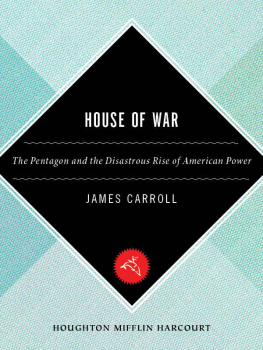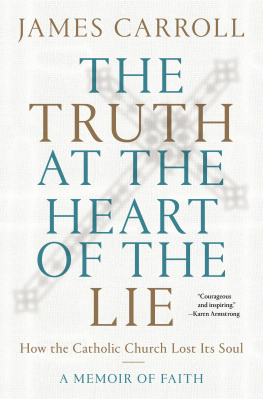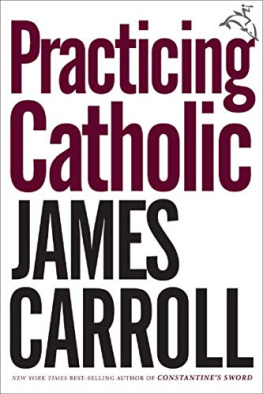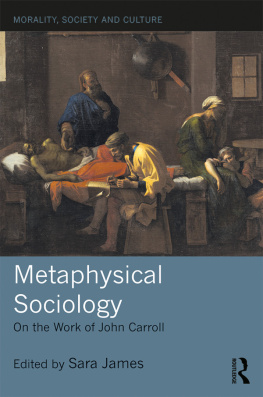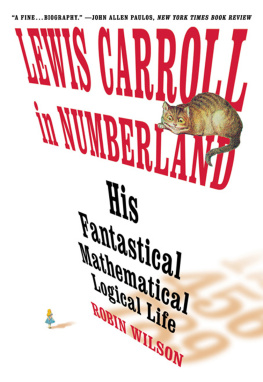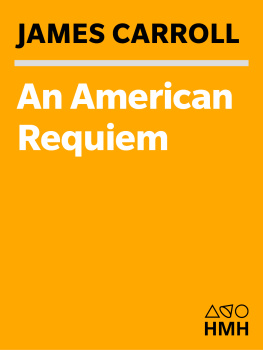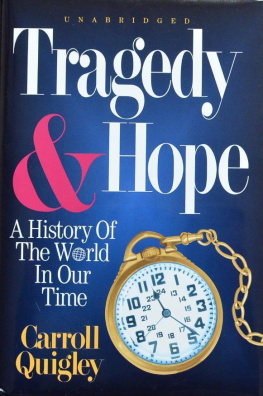James Carroll - House of War: The Pentagon and the Disastrous Rise of American Power
Here you can read online James Carroll - House of War: The Pentagon and the Disastrous Rise of American Power full text of the book (entire story) in english for free. Download pdf and epub, get meaning, cover and reviews about this ebook. year: 2007, publisher: Houghton Mifflin Harcourt, genre: Science. Description of the work, (preface) as well as reviews are available. Best literature library LitArk.com created for fans of good reading and offers a wide selection of genres:
Romance novel
Science fiction
Adventure
Detective
Science
History
Home and family
Prose
Art
Politics
Computer
Non-fiction
Religion
Business
Children
Humor
Choose a favorite category and find really read worthwhile books. Enjoy immersion in the world of imagination, feel the emotions of the characters or learn something new for yourself, make an fascinating discovery.
- Book:House of War: The Pentagon and the Disastrous Rise of American Power
- Author:
- Publisher:Houghton Mifflin Harcourt
- Genre:
- Year:2007
- Rating:4 / 5
- Favourites:Add to favourites
- Your mark:
- 80
- 1
- 2
- 3
- 4
- 5
House of War: The Pentagon and the Disastrous Rise of American Power: summary, description and annotation
We offer to read an annotation, description, summary or preface (depends on what the author of the book "House of War: The Pentagon and the Disastrous Rise of American Power" wrote himself). If you haven't found the necessary information about the book — write in the comments, we will try to find it.
House of War: The Pentagon and the Disastrous Rise of American Power — read online for free the complete book (whole text) full work
Below is the text of the book, divided by pages. System saving the place of the last page read, allows you to conveniently read the book "House of War: The Pentagon and the Disastrous Rise of American Power" online for free, without having to search again every time where you left off. Put a bookmark, and you can go to the page where you finished reading at any time.
Font size:
Interval:
Bookmark:

Copyright 2006 by James Carroll
ALL RIGHTS RESERVED
For information about permission to reproduce selections from this book, write to Permissions, Houghton Mifflin Harcourt Publishing Company, 215 Park Avenue South, New York, New York 10003.
www.hmhbooks.com
The Library of Congress has cataloged the print edition as follows:
Carroll, James, date.
House of war : the Pentagon and the disastrous rise
of American power / James Carroll.
p. cm.
Includes bibliographical references and index.
ISBN -13: 978-0-618-18780-5
ISBN -10: 0-618-18780-4
1. United States Military policy. 2. Pentagon (Va.)
3. United States Dept. of Defense. 4. Militarism United
States History 20th century. 5. Militarism United
States History 21st century. 6. Arms race United States
History 20th century. 7. Arms race United States
History 21st century. I. Title.
UA 23. C 274 2006
355'.033073'09045dc22 2005024014
e ISBN 978-0-547-52645-4
v1.1012
Grateful acknowledgment is made to Rosanna Warren and Daniel Berrigan for permission to quote from their poetry.
IN MEMORY OF
Lieutenant General Joseph F. Carroll
***
For Elizabeth Marshall Carroll
and
Patrick Marshall Carroll
The potential for the disastrous rise of misplaced power exists and will persist. We must never let the weight of this combination endanger our liberties or democratic processes. We should take nothing for granted.
P RESIDENT D WIGHT D. E ISENHOWER ,
farewell address, January 17, 1961
THE INVISIBLE BOY
The Building looms over the Potomac across sixty years of war and peace, through six decades of memory. A forbidden temple even now, when I am olderimagine how the sight of it hit the child who first came here with his dad.
What did I know? Young, pining at the slick, slanting terrazzo, I wanted nothing more than the place for my very own, the largest playhouse in the world. Five sides, five stories, five rings by alphabet, four moats, seven spokes, triple the square footage of the Empire State Building, covering thirty full acres, a mile in circumference, with seventeen and a half miles of looping corridors in which to run. But the ramps were best, and at five sharp the workers made for their cars, like shells bumpedy-bumpedy after the tide. I watched them go, glad to have the place to myself, because my dad worked late. I tried counting the rush-hour refugees, but there were more people than any place outside China, which Dad was watching. When they were gone, with no chrome helmets in sight, I stepped out of my shoes for the slick glide of stocking feet down the ramps.
There were eighteen dining rooms that served sixty thousand meals a day. There were two barber shops, a drugstore, a vaccination clinic, five "beverage bars," each with more swivel stools than even a swift lad like me could set to spinning. There were six hundred drinking fountains, and I sipped from most of them. A clock room had the right time for every place right down to Moscow, Russia. Grown-up men rode three-wheeled bikes with baskets, messengers with their bells blastingmake way for secrets! In corners stood faded battle flags attached to spears, with streamers flowing from the blades. On the walls hung paintings of warplanes and horses, tanks and dead-eyed men. Parthenon, PantheonI couldn't keep the words straight. Call it Paradise. It was not so much to want for a lad of ten.
I was the invisible boy, keen, brimming with stealth, spying it all from my unnoted perch in the rush-hour throng, or standing stock-still against the wall, which was the color of a robin's egg. A boy could get lost, and I did. No windows to mark, no signs, just numbers and letters painted everywhere. It was dangerous to lose my way; they could shoot me for being a spy. Open no door, speak to no stranger. I will tell them, if asked, I am going to the john. Even if they torture me, I will not tell them about my father.
That was the real wonderDad worked here! He was uniformed, like all those otherstan or blue, depending on the season, but always hatless in the vast indoors. In the early morning, I would have watched him at the sink: slapping on after-shave, shining a shoe on the edge of the toilet bowl, adjusting the silver stars on the shoulders of his coat, making sure the points were aligned. And then, clickmy father striding into the Building, taking salutes, returning them with the very fingers that snapped to the music of the car radio as we drove home.
Soon that primal identification of man and building would form the unslippable knot of my young life, forever tying me to the mystical stake in the middle of the five-sided courtyard, if I could only find it. Corridors and Corregidors, dead ends and deadly force, hallway ramps and Pork Chop Hillit was so easy to get lost looking for the center of the maze. At last a window! I ran to it. But that courtyard, seen from the window in the center ring, was always a surprise. In the hub of the world's fortress was grass, a patch of grass, green, vacant, growing there like a spillover plot from the cemetery on the hill. Even I knew that the proximity to Arlington made the Pentagon the largest tombstone in the world. As for the courtyard, its five little acres must have been God's to warrant such protection.
But I knew. That courtyard, stillpoint of the swirling Building, was also known as ground zero, I hustled, not quite running (Don't let them know you don't belong here, fool!), through the tiled forest, minefield, no man's land, searching for my Air Force father's office, looking for my dad.
For square footage of floor space, the Pentagon would be surpassed only by New York's World Trade Center, in 1973. Once American flight 11 and United flight 175 had brought the twin towers down, the Pentagon, though wounded, resumed its place as the nation's largest building. But in the aftermath of the 9/11 attacks, the Building looked strangely fragile. Soon a kind of huge bandage was stretched into place, hiding the broken wall. An American flag was positioned over that construction tarp. As the nation's trauma centered on New York, the Pentagon moved to the margin of communal awareness, where it had always been.
When the Building was hit by flight 77, I recognized for the first time in years how the Pentagon had seared my soul when I was a boy. The universal grief and pain of September 11 was, in my case, centered on an ache attached to Arlingtonan ache that tied the trauma to a line running through my life.
After my initial infatuation with the Pentagon, I had been conscripted into youthful criticism of America's wars, and therefore of the Building's work. September 11 could seem to be the American Cold War nightmare come a little late, an approximation of the mushroom cloud, complete with its own ground zero. That the terrorists had included the Pentagon in their assault seemed, even amid the outrage of that day's mayhem, somehow inevitable. American power was being attacked that dayeconomic power, military power, and, if the airliner downed in Pennsylvania had reached its target, thought to be the Capitol or the White House, political power. The haste with which the gap in the southern wall of the edifice in Arlington was covered up, and the efficiency with which Defense Department headquarters was moved to the edge of the field of national attention in the months and years after September 11, raised questions of their own, at least for me.
What does the Pentagon mean, actually, to the United States of America? How is its influence felt, its power exercised? Since ground was broken in 1941, what has the Building's effect been on the nation's sense of itself, its place in the world? How has the struggle for the American soul been won or lost here? Those questions, among others, form the spine of this book.
Next pageFont size:
Interval:
Bookmark:
Similar books «House of War: The Pentagon and the Disastrous Rise of American Power»
Look at similar books to House of War: The Pentagon and the Disastrous Rise of American Power. We have selected literature similar in name and meaning in the hope of providing readers with more options to find new, interesting, not yet read works.
Discussion, reviews of the book House of War: The Pentagon and the Disastrous Rise of American Power and just readers' own opinions. Leave your comments, write what you think about the work, its meaning or the main characters. Specify what exactly you liked and what you didn't like, and why you think so.

